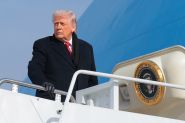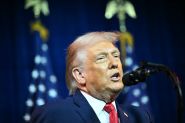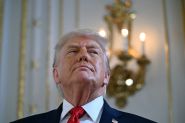- Home
- Middle East
- National Guard Begins DC Deployment Despite Uproar
President Donald Trump announced on August 11 the deployment of approximately 800 National Guard troops to Washington, DC, to assume temporary federal control over the city's police force. The move, which Trump framed as a response to escalating crime, has drawn widespread scrutiny, given that official statistics indicate violent crime in the city has declined.
Standing alongside Attorney General Pam Bondi, who will oversee the federal takeover of the DC police, Trump portrayed the action as a bold step to restore law and order. He also said that the National Guard would be “allowed to do their job properly,” and that federal agents would assist in policing the city.
The National Guard is a unique branch of the US military that serves both state and federal roles. Unlike active-duty troops, Guard members can be deployed by state governors for local emergencies, such as natural disasters or civil unrest, or by the president for federal missions.
In Washington, DC, the Guard is federally controlled, giving the president direct authority to mobilize troops without going through a state government, a distinction that allows Trump to deploy forces to the capital in response to the alleged public safety concerns he cited.
Historically, DC Guard units have been deployed during major crises, including the 1968 riots following Martin Luther King Jr.'s assassination and more recently during the January 6, 2021, Capitol attack, illustrating how their presence is reserved for extraordinary circumstances.
The legal authority Trump cited, Section 740 of the 1973 Home Rule Act, allows the president to assume temporary control of the Metropolitan Police Department when “special conditions of an emergency nature exist.” The provision is rarely used and only allows federal control for up to 30 days, with congressional notification required. Washington is unique in that its National Guard is federally controlled, giving the president direct authority to mobilize troops in the city, a power governors of other states do not possess.
The question remains: Is there a crime wave? That’s where the narrative diverges sharply.
Trump portrayed DC as spiraling into chaos, with the local DC government losing control of public safety in the city. He also clarified that the capital has a violent crime rate that is higher than some of the most dangerous places in the world.
However, official data tell a different story: both violent crime and carjackings have declined, with violent crime down about 35% in 2024 and continuing to fall in 2025, bringing the city to a 30-year low.
National Guard troops began arriving in Washington, DC, on August 12, 2025. Approximately 800 National Guard members were mobilized, with 100 to 200 expected to be on duty at any given time.
The National Guard is operating in support roles, such as logistics, perimeter security and safeguarding federal buildings. They are not authorized to make arrests directly, but may assist in detaining suspects temporarily. Federal law enforcement agents have conducted a surge operation across the city, resulting in 23 arrests and the seizure of six illegal firearms. The arrests included charges of homicide, weapons violations, lewd acts and stalking.
What Are Critics Saying?
Local leaders immediately criticized the president’s intervention. DC Attorney General Brian Schwalb described the move as “unprecedented, unnecessary and unlawful,” emphasizing that the mayor and city police should retain primary authority over law enforcement decisions. Mayor Muriel Bowser described the federal intervention as “unprecedented federal overreach,” an action critics say could set a concerning precedent for federal intervention in locally governed cities.
House Republicans have expressed support for Trump’s move and plan to hold hearings as the 30-day federal control period nears its end, noting that any extension would require congressional approval. Meanwhile, legal experts and policy analysts caution that the intervention could set a concerning precedent, signaling a potential shift toward federally enforced policing and raising questions about the balance of power between local governments and the federal administration, particularly in cities led by political opponents.
Read more




Comments